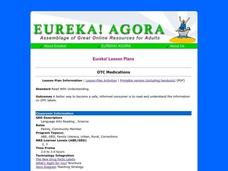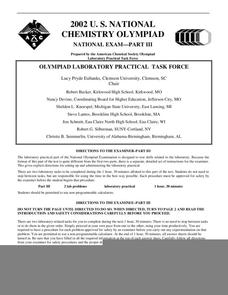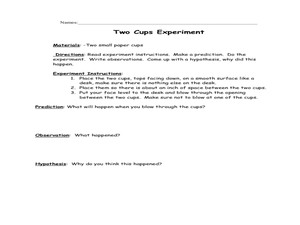Conneticut Department of Education
Instructional Strategies That Facilitate Learning Across Content Areas
Imagine 28 instructional strategies, appropriate for all subject areas and all grade levels. Directed Reading-Thinking Activities (DRTA), Question-Answer Relationship (QAR) activities, KWL charts, comparison matrixes, classification...
Curated OER
2001 U.S. National Chemistry Olympiad Part III
Here is a comprehensive method for assessing chemistry learners' knowledge; have them approach two laboratory problems, plan their methods of solving each, and then actually carry out the experiments to find the answers. Both the...
Baylor College
Animals' Needs
Explore the wonderful world of earthworms as your class learns about the requirements of animal life. After building soda bottle terrariums, students observe worms over the course of a couple weeks, building an understanding that all...
Baylor College
What's Is Soil Made Of?
It's time to roll up those sleeves and get a little dirty in the second lesson of this series on the science of food. Investigate where plants and animals get the minerals they need to live in this two-part exploration of soil. First,...
New York State Education Department
TASC Transition Curriculum: Workshop 10
How have educational standards evolved? Educators of adults examine expectations in the 10th workshop out of 15 to better determine how standards have grown. Participants respond to a variety of sample questions to determine how they...
Baylor College
Needs of Plants
What better way to learn about plant life than by creating a class garden? Young botanists start with a brief discussion about radishes before planting seeds and watching them grow. To determine the importance of water, sunlight, and...
Baylor College
Energy for Life (Energy from Food)
Energy comes in many forms, but how do living things get the energy they need to survive and thrive? In a simple, controlled experiment with yeast, water, and sugar, groups make observations about how yeast reacts with water alone, then...
Curated OER
Designing and Creating Earth Science Lessons with Google Earth
Everything from adding an overlay to uploading images to navigating the software, teachers become apt at using Google Earth™ in the classroom to create Earth Science lessons.
Curated OER
OTC Medications
Students become aware of better ways to read and analyze the information provided on OTC labels. This concept is accompanied with the integration of technology, brochures and a Venn Diagram for illustration. They assess medical...
Baylor College
Digestion
Digestion is an amazing and complicated process that provides humans with the energy they need to survive. Lesson six in this series on the science of food uses sliced turkey and a meat tenderizer to demonstrate how enzymes help break...
Curated OER
1999 U.S. National Chemistry Olympiad Part III
In this chemistry olympiad laboratory worksheet, learners design and carry out two experiments. They design one experiment to test for the percent mass of a substance in a solution and they design another experiment to identify two...
Curated OER
2002 U.S. National Chemistry Olympiad National Exam - Part III
Two laboratory problems are put forth for chemistry students. They are to plan and carry out an experiment that will answer each of the questions. The first asks them to investigate a relationship between the surface area of a potato and...
Curated OER
2006 U.S. National Chemistry Olympiad Part III
In this chemistry Olympiad lab worksheet, students are given two lab problems to design experiments. Topics include determining the mass percentage of a given compound and determining an unknown metal using quantitative and qualitative...
Curated OER
2003 U.S. National Chemistry Olympiad Part III
In this chemistry Olympiad learning exercise, pupils are given 2 lab problems to work on. They must explain their experiment they would carry out, show their data and write their results and conclusions of the lab and the process.
Towson University
Mystery Tubes
How do scientists know they're right? Truth be told, they don't always know. Explore the scientific process using mystery tubes in an insightful activity. Young scientists discover how to approach and solve problems in science, how ideas...
Curated OER
You Light Up My Life: Developing a Scientific Theory for What Fuels a Candle's Flame!
Students examine how candles work and how scientific theories are developed and tested. Students propose hypotheses about what is burning in a candle then perform tests in order to develop their scientific theory. After a teacher...
Curated OER
Understanding Bernoulli's Principle
Fifth graders explain why we fly. For this space science lesson, 5th graders discuss Bernoulli's prinicple and its relation to flight.
Curated OER
Circular Motion
High schoolers research physical science by completing worksheets. In this gravity lesson, students read assigned text regarding the rotation of Earth and the gravitational force caused by the speed of which it rotates. High schoolers...



















